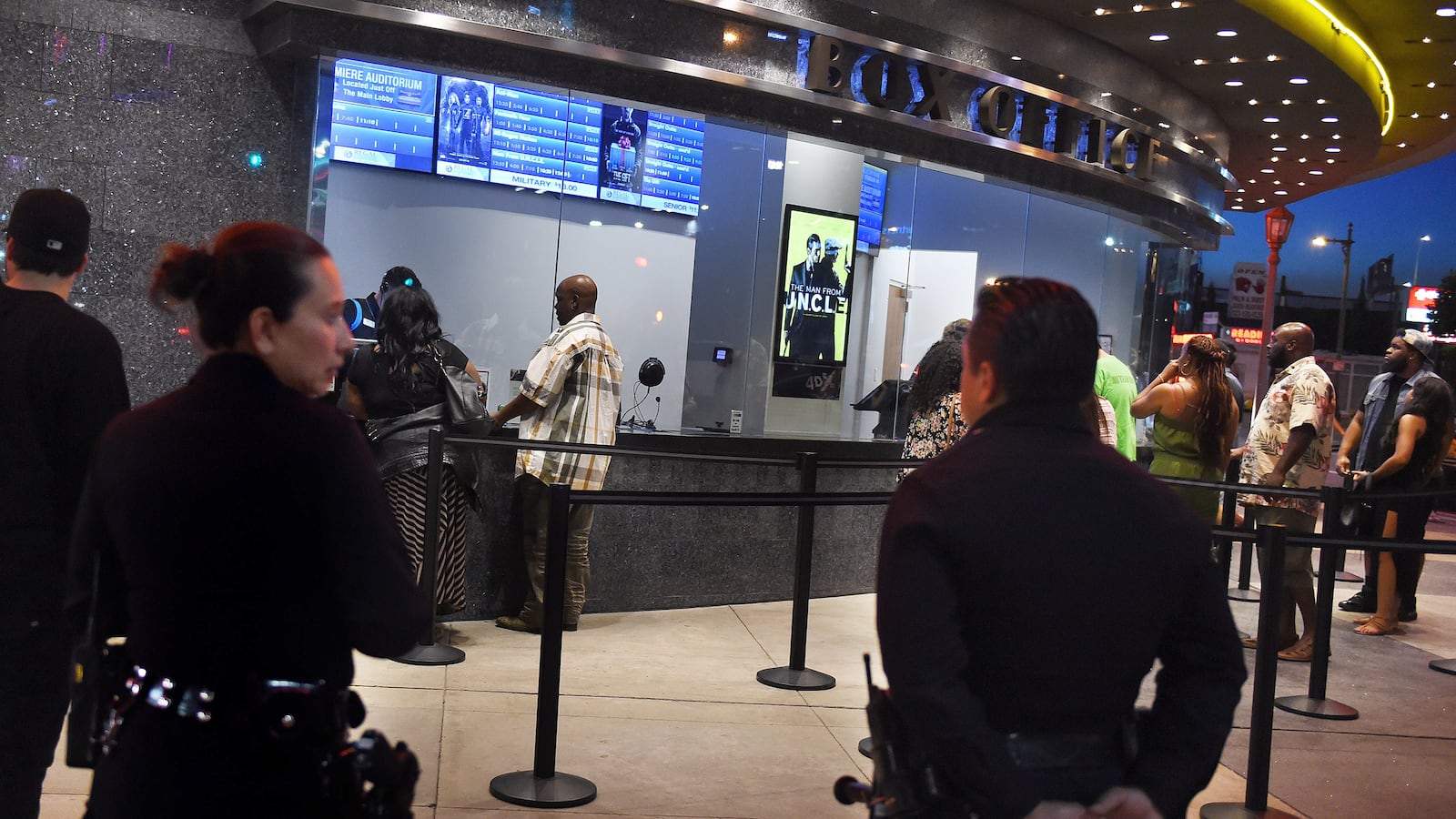If a list of the year’s top box office debuts reads as a logline of usual suspects—a Jurassic Park reboot here, a new Avengers movie there—this weekend has injected fresh blood into the works. Now, right below Disney’s live action Cinderella and right above Marvel’s Ant-Man, there’s Straight Outta Compton, the story of how hip-hop group N.W.A. rose to glory from the streets of Compton in the 1980s.
Produced by original members Ice Cube and Dr. Dre, directed by F. Gary Gray of Friday and The Negotiator fame, and starring Ice Cube’s own son as the famed emcee, Straight Outta Compton and its $60.2 million opening weekend are testaments to the power of diversity at the box office.
The film’s success is a win not just for fans of N.W.A or for black filmmakers and black audiences, but also for anyone who wants to see different kinds of movies at the multiplex instead of rehashes of the same films by the same people in the same genres.
This is such obvious good press that news of Universal Pictures offering to help pay for increased security at screenings of Straight Outta Compton seems like a shot in the foot as much as it does a betrayal of their audience.
Neither Universal nor theater chain Regal Cinemas was available for comment on the issue of cinema security, seemingly because the issue is an embarrassment. There were no incidents reported from any screenings of Straight Outta Compton this weekend, nor were any expected. However, it is worth noting that Straight Outta Compton is Universal’s first release since the shooting in Lafayette, Louisiana, at a screening of Trainwreck, which was also a Universal property.
If Universal was ordering extra security at screenings of Straight Outta Compton as a means to protect citizens of color from the wave of hate crimes that have recently occurred when those who are not white and male attempt to gather, then it would be justified. But in a statement released to Deadline, Universal clarified their involvement: “The studio has not solicited enhanced security for theaters that will be showing the film this weekend, but has partnered with those exhibitors who’ve requested support in their locations.”
So if Universal wasn’t asking for beefed-up security, then all signs point to the theaters. And that’s where the situation gets dicey.
This isn’t the first time that theaters have requested amped-up security for a black-led film. Two years ago, theaters made the same requests for Lee Daniels’ The Butler, a film that depicted the evolution of the civil rights movement. In the case of either film, the director was a black man, the stars were black, and the audience was expected to be black too. Their audiences were also primarily over 30, an age group not typically associated with the kind of “gang-oriented” violence theaters allegedly feared.
Gang-related violence is often cited as a means of justifying excessive policing of black populations. If this were the early ’90s and Straight Outta Compton had just premiered, theaters taking on extra security might make more sense.
When Ice Cube made his film debut in John Singleton’s Boyz N the Hood in 1991, shootings across the country welcomed the film’s premiere, including one in Chicago that resulted in a victim’s death. At the time, Singleton asserted that his film, which was as critical of gang violence as it was of police violence, had been marketed as a gang film. But the hip-hop culture of 1991 is different than the hip-hop culture of today.
1991 was a banner year in the golden era of hip-hop: 2Pac released his first studio album and Dr. Dre and Suge Knight opened Death Row Records, among other benchmarks. At that time, hip-hop was directly engaged with the action of the streets. While predecessors Public Enemy had built their following on politically charged lyrics, N.W.A brought those politics to the street. Gangsta rap was an artistic movement that actively engaged with the anger of living amid violence, and its stars were often both survivors and participants who used their music to speak to the men and women whose lives were still caught in cycles of violence. N.W.A produced hip-hop as catharsis.
While there are hip-hop artists today who still operate in the same mode as their ’90s counterparts, rap’s function as violent catharsis is, for the most part, in the past. One has to look no further than the Meek Mill and Drake beef to see just how much hip-hop has changed in the last 25 years. While Drake’s allegedly ghostwritten, middle-class, deliberately soft Canadian rap would have been eaten alive in the Straight Outta Compton era, today Meek is the one who has had to scramble, despite his cred as a street kid from Philadelphia.
Hip-hop marches to the beat of the capitalist drum these days—it’s the dollars, not the guns in your pocket that make the man now. In days when you can barely get most rappers to mention #BlackLivesMatter on Twitter, let alone in the streets, it’s time to stop worrying that rap might be violently opposed to police.
On the contrary, when reports come in that movie theaters or churches or schools have been shot up, it’s not a black face that I’ve come to expect—and besides the backwards crew at CNN, I don’t think anyone was expecting violence at showings of Straight Outta Compton this weekend. But hey, if movie theaters want to start protecting their patrons from actual menaces to society like James Holmes and John Russell Houser, I’m all ears.






